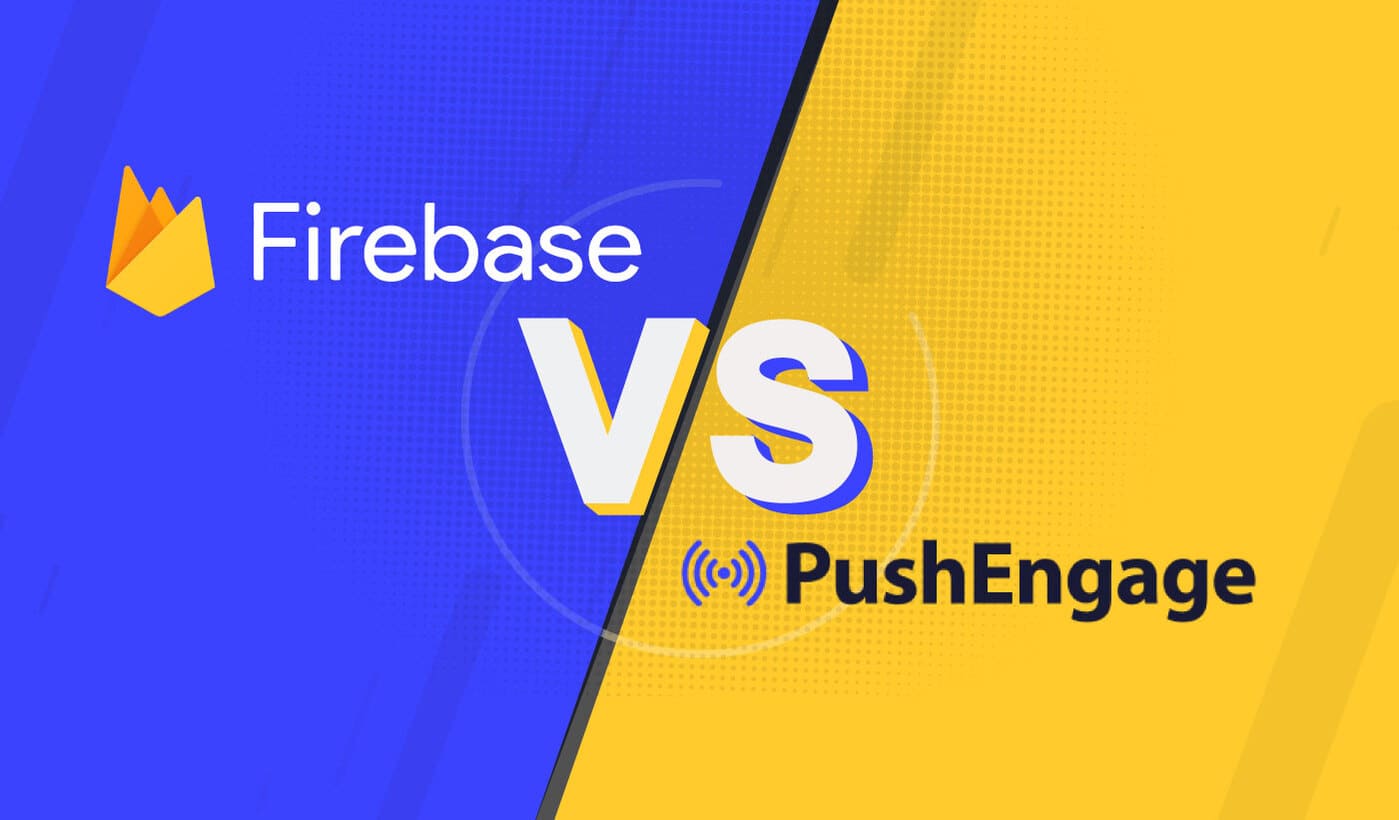If you’re new to push notification campaigns, or if you’re just starting out…
One of the most critical questions to answer is: What’s the best platform to send push notifications?
Firebase Cloud Messaging (FCM) is one of the most popular freemium solutions out there. If you consider that it’s a Google product, there are no good reasons to shrug off FCM. At least, not on the surface.
And that’s what this article is all about.
We’re about to break down why FCM seems great on the surface but really isn’t.
In fact, a service like FCM is one of the reasons we built PushEngage in the first place.
Let’s dive in.
A Quick Overview: Firebase Cloud Messaging vs PushEngage
Both PushEngage and Firebase offer a free starting package. But if you take a closer look, PushEngage is a clearly better solution. And the simplest way to look at it is that PushEngage is a solution for both developers and marketers.
If you’re a developer, you can check out the PushEngage Javascript API to create super-advanced campaigns. But if you’re not a developer, you can still use your PushEngage dashboard to create some very powerful push notification campaigns straight off the rack.
But this is still a vague description of why PushEngage is better. We promised a complete breakdown, so here it is in one glance:
| PushEngage | Firebase | |
| Reliability | ✔️ 99.95% deliverability rates ✔️ Instant report on push notification delivery | ❌ Unreliable uptime with outages lasting up to days ❌ No transparency on downtime or deliverability |
| Ease of Use | ✔️ Easy to create web and mobile push campaigns ✔️ Clear preview of the final notification ✔️ Powerful customization options from a clear user interface ✔️ Built-in goal tracking, A/B testing, and dashboard analytics | ❌ Creating & managing campaigns requires coding and testing ❌ Incorrect notification previews that require further manual testing ❌ UI is not easy to use and customization is very limited ❌ Advanced features are missing even with their API |
| Customer Support | ✔️ Award-winning customer support for even free customers ✔️ Dedicate Customer Success Manager for Enterprise accounts ✔️ Best-in-class documentation and support documents ✔️ Tutorials, How-to’s, and marketing guides created from years of experience | ❌ Little to no support from the Firebase team ❌ Support comes mainly from developer communities and forums such as StackOverflow on a voluntary basis ❌ Documentation (even for developers) is quite lacking |
| Pricing | ✔️ Completely free hosting for all accounts to store push notifications and rich media ✔️ The free tier is built to help you kickstart a small business and comes with generous limits ✔️ Business plan starts at $9/month ✔️ Premium plan starts at $29/month ✔️ Enterprise plan offers a custom quote on request | ❌ You pay $0.15/GB of data transfer. This becomes very expensive very quickly with rich media. ❌ Free option is available, but with an add-on policy. The pricing structure is very complicated and becomes expensive once you start needing advanced options. |
Now that you have a proper overview of what to expect from both services, let’s take a closer look at these deciding factors.
Reliability Check: Is the Platform Even Worth It?
The worst feeling in the world is working on a marketing campaign for ages, getting all the stakeholders on board, and fine-tuning every aspect of your offer for a major holiday sale only to realize that…
You can’t send out your push notifications at all.
Unfortunately, Firebase Cloud Messaging has been known to be extremely unreliable. The platform frequently crashes, leaving the users high and dry without any support at all. If the crash is due to a major bug, Firebase may come out publicly with a statement that “they’re working on it”.
If your business is on the line, that’s not the most comforting thing to hear.
That’s why PushEngage prioritizes uptime and you get instant updates on your delivery right from the PushEngage dashboard:

On the other hand, FCM has had incidents with their App Distribution product that have gone unresolved for over 77 days!
Moreover, FCM doesn’t support any of the newer Huawei devices that don’t use Google Mobile services. And if your users are in mainland China, you can forget about sending push notifications using FCM. China has a long-standing firewall that blocks out all Google services.
Does this mean that FCM is all bad?
No. There are some reliable parts of the FCM API that even we use to distribute app notifications. But as far as possible, we avoid using FCM if we can.
Ease of Use: Redefined
As far as ease of use goes, FCM is incredibly difficult to use unless you’re a bona fide developer.
On the other hand, with PushEngage you get a complete user interface. Most of the campaigns you set up are as simple as pointing and clicking on a button. And it’s really easy to install PushEngage on any website.
Maintaining a push notification campaign on FCM is a nightmare because of frequent browser updates. On PushEngage, that’s all done for you. And most importantly, you get instant previews of what you’re about to send:

And this is super accurate. With FCM, it’s really difficult to know upfront what your push notification actually looks like. So, you have to constantly monitor, test, and update each notification manually.
Customization is also really difficult with FCM because there’s really no user interface that you can use. With PushEngage, though, you can customize practically anything about your push notifications:
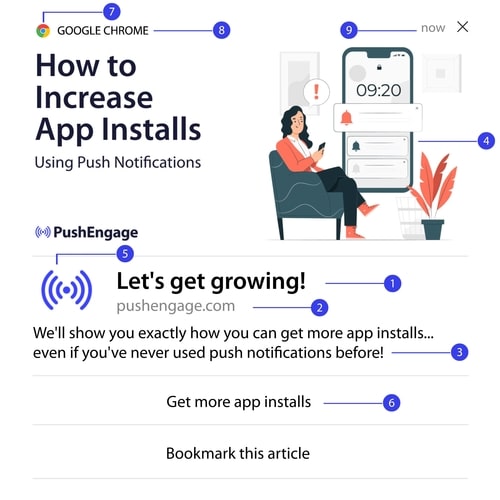
If you’re not sure what the different parts of push notifications are, you should check out our beginner’s guide to push notifications.
PushEngage makes it really simple to create and manage push notification campaigns. Each customization option includes detailed in-line help to demonstrate how to use it. And we’re talking about automated push notifications as well.
You end up saving a lot of time wasted on testing. And you can run your campaigns with full confidence.
Then, there’s the matter of segmenting your users for personalized push notifications. On the surface, Firebase seems to have great options for segmenting users:
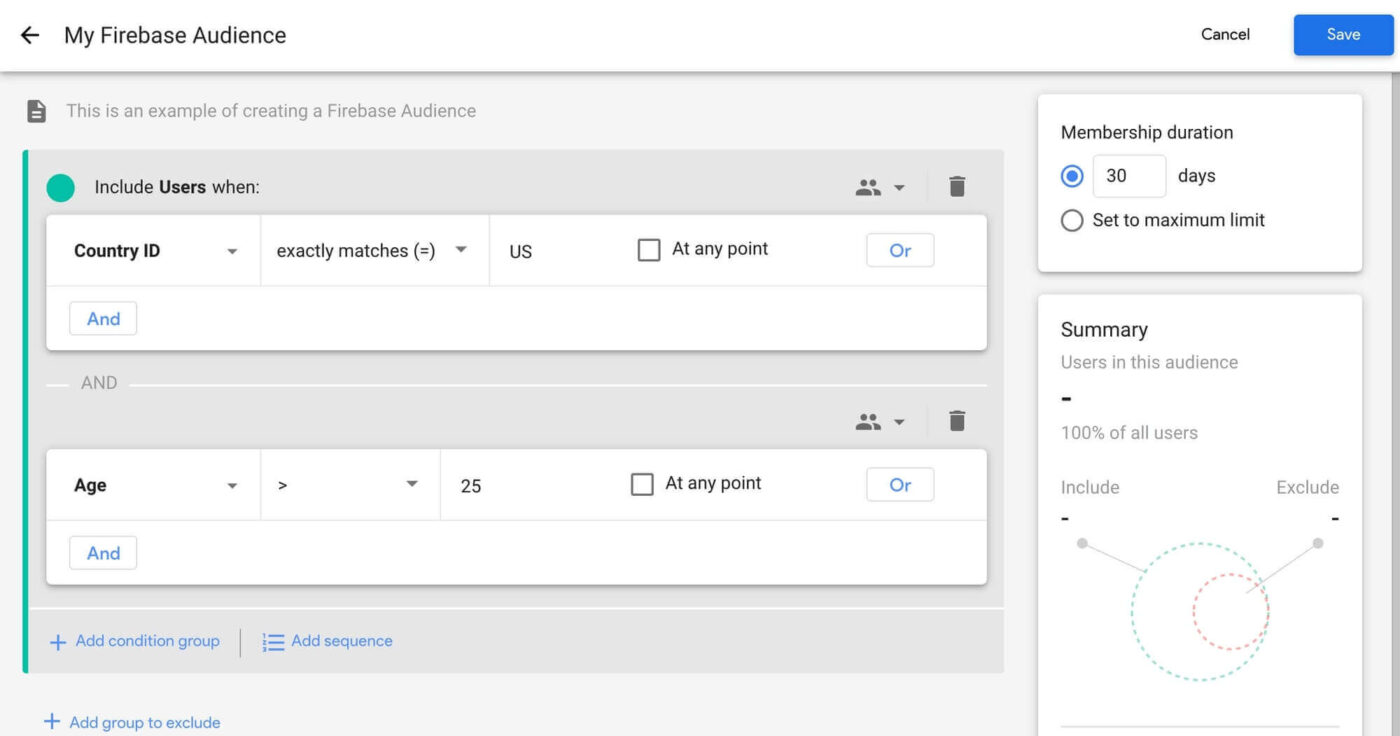
The problem is that this segmentation isn’t really dynamic.
In simple words, your users won’t get transferred from one audience segment to another automatically even if they qualify until they open the app on their device the next time.
So, this can cause a massive mismatch in what your audience wants from you and what you’re actually sending them. This is especially true if you’re using push notifications to improve app or site engagement because a large chunk of your audience returns to your content only AFTER they receive a notification.
What’s even worse is that Firebase filters may not work on audience segments with less than 10 subscribers. And that’s horrible if you’re just getting started with push notifications or if you’re a small business that has a small, loyal audience in the first place.
PushEngage dynamically segments your subscribers in real-time.
So, you can focus on growing your business instead of worrying about the technical aspects of sending push notifications.
And it’s really simple to create segments using PushEngage. Simply head over to Segments » Create New Segment:
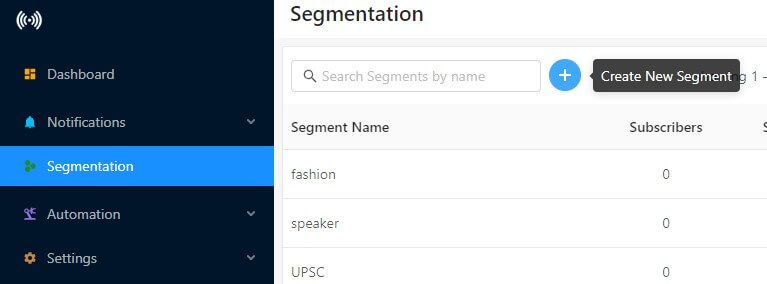
And if you need some help with creating custom segments, you can simply check out our article on how to segment subscribers automatically.
Customer Support & Documentation
If you’re a small business that has a small or no development team, you REALLY shouldn’t use Firebase Cloud Messaging to send push notifications. You won’t get any customer support from the Firebase team directly. And if you need help, you’ll have to rely on developer communities such as StackOverflow.
It could take days for you to resolve any technical issue you may have.
And even if you have a development team, there’s barely enough product documentation in Firebase to be able to use the product properly. You can try to get in touch with the Firebase team for help by filling out a form on their website. But it’s highly unlikely that you’ll get any response at all.
PushEngage offers outstanding customer support even for free users.
If you opt for the Enterprise plan, you even get a dedicated Customer Success Manager to help you with absolutely anything. You can reach out to us anytime you need us right from our website. We’re always available in the live chatbox on our website.
And if you’d like to share a more elaborate problem, you can get in touch with our Customer Success team anytime.
We address all queries within 24 hours.
There’s also a huge repository of content in our blog section. We constantly create content that helps you grow faster and troubleshoot any issues that you may have.
Pricing Breakdown
Did you know that you can’t really upload pictures on the Firebase free plan?
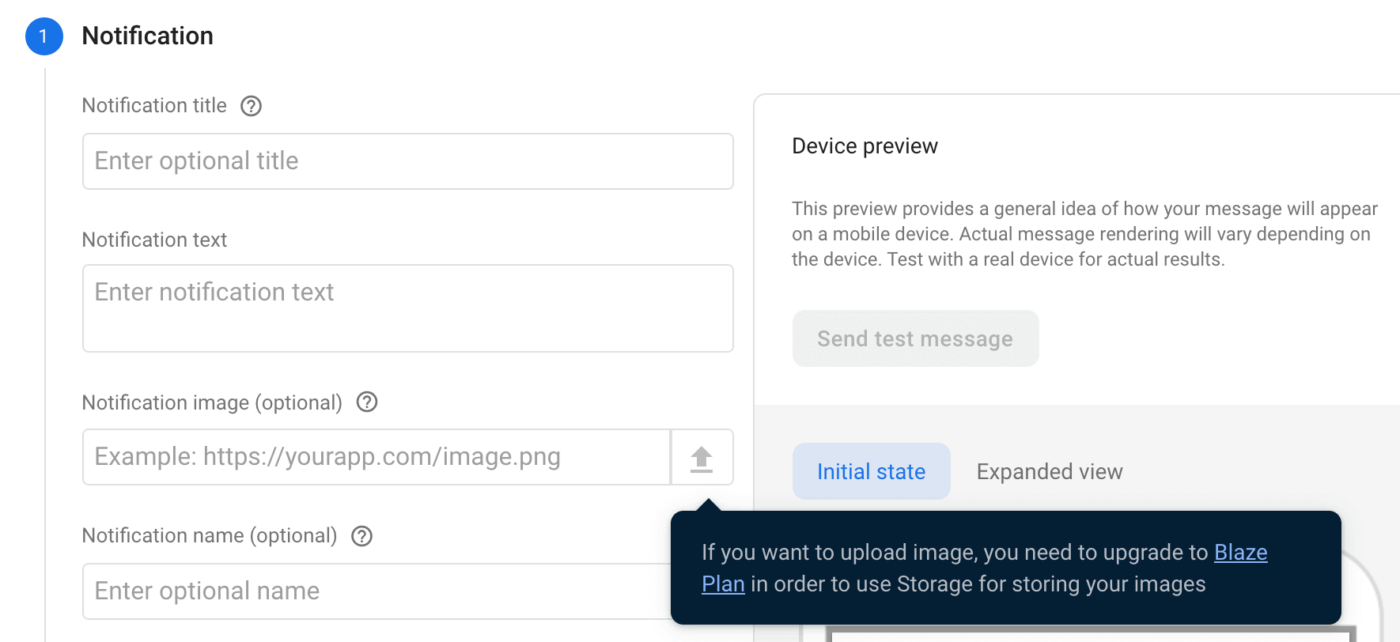
Forget about creating rich push notifications with advanced media formats, you can barely create a simple notification with an image.
Well, you can… If you can upgrade to a paid plan.
The worst part is that Firebase’s paid plans all have sliding tiers. There’s no fixed price. You get billed for the resources you use for each notification. And the problem with that kind of billing is that it’s really easy to rack up a HUGE invoice without realizing how expensive it is.
One organization actually got billed $30,000 by Firebase for sending push notifications. And no, that’s not a typo.
PushEngage is way simpler. The free plan is actually free.
And while you can’t create automated push notifications in the free plan, you still get full access to all customization features for your push notifications. Most importantly, there are still enough features in the free plan to help you grow your business using push notifications for you to happily invest in one of our paid plans later.
If you’re entirely serious about growing your business, though, we really recommend signing up for one of our paid plans.
You get access to a whole host of really powerful campaigns such as cart abandonment reminders. And best of all, you’re never going to get billed an extraordinary amount that could bankrupt your business because of a coding error.
Wrapping Up
That’s all for this one, folks!
It’s simple: We built PushEngage to be inherently better than Firebase. And we’re constantly improving. Not just in terms of our features, but in our customer support as well.
So, while we’d like to say that it’s a close contest, there’s really no contest here.
If you sign up for one of the paid plans on PushEngage, you’ll get important features that can help grow any business including:
- Goal tracking and advanced analytics
- Smart A/B testing
- Automated drip campaigns
- Dynamic segmentation
- Triggered push notifications
And more!
So, if you haven’t already, get started with PushEngage today!
